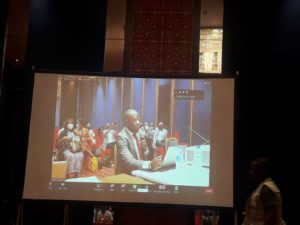
Willy Buloso, Regional Coordinator for Africa, ECPAT International
The 3rd African Girls’ Summit was held in Niamey, Niger, from 16th to 18th November 2021. As a platform that convenes stakeholders across Africa on girls’ rights and wellbeing, it brought together representatives from 35 African Union Member States, more than 100 Young Adolescent Girls and more than 1,500 stakeholders.
The theme for the 2021 summit was: “Culture, Human Rights and Accountability – Accelerating Elimination of Harmful Practices”, with the goal of providing a platform for sharing good practices, evidence and data to shift and galvanize action towards the elimination of harmful practices in Africa.
As part of the summit, ECPAT International’s Willy Buloso, Regional Coordinator for Africa, participated in the panel session on ‘Global and Regional Overview of Online Child Protection and Cybercrimes’. As internet and ICT services expand in Africa, more people including children are spending considerable time online, often unaware of any potential harm hence increasing their vulnerability to various cyber crimes including online sexual exploitation and abuse. The objective of the session was to:
During the session, Willy shared key findings on online child sexual exploitation and abuse from the Disrupting Harm: Kenya and Disrupting Harm: Uganda reports, a collaborative study conducted by ECPAT, INTERPOL, UNICEF Office of Research, and their networks.
Some of the findings from Disrupting Harm: Kenya report include:
In Uganda, the Disrupting Harm: Uganda report uncovered that:
Click here to learn more about the Disrupting Harm project.
Other members of the panel included Hon. Patricia Kaliati (Minister of Gender and Social Welfare of Malawi), Hon. Dr. Linah Jebii Kilimo (Chief Administrative Secretary, Ministry of Public Service & Gender of Kenya), Afrooz Kaviani Johnson (Chief, child protection specialist, UNICEF HQ), Mr. Serge Valery Zongo (Program Officer at ITU) and Fargani Tambeayuk (Head of Connectivity Policy, Africa at Facebook/Meta).